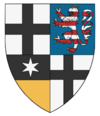Hochdeutsch
Hochdeutsch | |
|---|---|
| Country | |
| Settled | 1863 |
| Part of Pomerode | 21 January 1959 |
| Canton of N.S. Rhine | 6 January 2021 |
| Capital | Däzchen |
| Government | |
| • Type | Devolved government |
| • Steward | Guilherme Däzchen |
| Population | |
| • Total | 4 (permanent) |
| Demonym | Hochdeutsch |
Hochdeutsch, officialy the Canton of Hochdeutsch (Hunsrik: Kanton von Hochdeutsch; Portuguese: Cantão de Hochdeutsch) is a Neo-Rhenish canton enclaved in the Brazilian city of Pomerode, within the state of Santa Catarina. Its capital is the municipality of Däzchen, which is the canton's sole municipality. Hochdeutsch is New Southern Rhine's only case of city state, although the canton and its only municipality have separate government entities. Hoichdeutsch is also the country's only canton on which the Hunsrik is the sole official language. The canton is administered by a Steward, while its only city is administered by a Prefect.
The territory that makes up the modern-day canton was inhabited by the Xokleng Indians until the 16th century, when it was conquered by the Portuguese and annexed to Brazil. Pomeranian immigrants settled in the region in 1863, establishing the colony of Pomerode within the municipality if Blumenau, in the Brazilian Empire. During this same period, the Scherer family settled in the region. In 2021, influenced by micronationalism, Jonathan Scherer-Arrais proclaimed the independence of his family properties and founded Independent State of the New Southern Rhine. His family's properties in the Brazilian city of Pomerode were converted into the Neo-Rhenish canton of Hochdeutsch.[1]
References
- ↑ Neo-Rhenish Government. The New Southern Rhine. Published on 20 December 2021. Retrieved on 20 December 2021.
